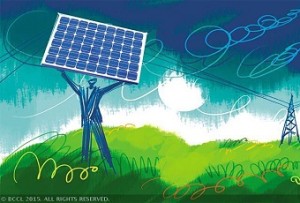India and other solar rich countries including Argentina, Burkina-Faso, Chad, France, Ivory Coast, Mali, Namibia, Niger, Nigeria, Sénégal, Uganda and Yemen have jointly supported commissioning of a study to define and structure a Common Risk Mitigation Mechanism (CRMM) for solar power generation projects in solar rich countries.
Background Information:
Currently, cost of capital, accounts for major portion of the final cost of renewable energy, in particular solar PV. As per a calculation by Council on Energy, Environment and Water, cost of capital accounts for 70% of the total cost of solar power in India.
Objectives of Common Risk Mitigation Mechanism (CRMM):
The proposed CRMM will facilitate in creating a secure environment for private institutional investment in solar assets. It will help to diversify and pool risks on mutualized public resources and unlock significant investments.
Task Force for study to define and structure a Common Risk Mitigation Mechanism (CRMM):
The study was entrusted by the Interim Secretariat of International Solar Alliance to a task force comprising Terrawatt Initiative (TWI), the World Bank Group, Confederation of Indian Industries (CII), the Currency Exchange Fund (TCX) and the Council on Energy, Environment and Water (CEEW).
- The task force will seek inputs from public and private stakeholders and partners through consultation.
- Each participating country may appoint a qualified representative to liaise with the task force and convey information regarding respective country’s specific expectations, experience and needs.
About International Solar Alliance (ISA):
The International Solar Alliance is an alliance of countries which are located completely or partly between Tropic of Cancer and Tropic of Capricorn.
- It was jointly launched by the Prime Minister of India Narendra Modi and the then President of France Francois Hollande in November 2015 in Paris, on the side lines of COP21.
- Under the ISA, solar rich countries share and aggregate data regarding their needs and objectives; emulate successful practices; and set up common mechanisms and instruments, in order to address obstacles to deployment at scale of solar energy.
- In January 2016, PM Narendra Modi, and the then French President François Hollande jointly laid the foundation stone of the ISA Headquarters and inaugurated the interim Secretariat of the ISA at the National Institute of Solar Energy (NISE) in Gurugram, Haryana, India





